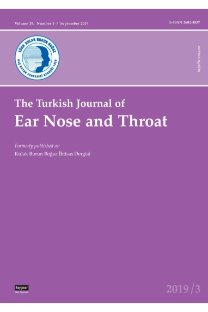Larengotrakeal invazyonlu ileri tiroid karsinomunun tedavisi
Ekstra tiroidal uzantı, segmental larengotrakeal rezeksiyon, tiroid karsinomu
Management of advanced thyroid carcinoma with laryngotracheal invasion
___
- Ortiz S, Rodríguez JM, Soria T, Pérez-Flores D, Piñero A, Moreno J, et al. Extrathyroid spread in papillary carcinoma of the thyroid: clinicopathological and prognostic study. Otolaryngol Head Neck Surg 2001;124:261-5.
- Andersen PE, Kinsella J, Loree TR, Shaha AR, Shah JP. Differentiated carcinoma of the thyroid with extrathyroidal extension. Am J Surg 1995;170:467-70.
- Compton CC, Byrd DR, Garcia-Aguilar J, Kurtzman SH, Olawaiye A, Washington MK. AJCC cancer staging atlas: a companion to the seventh editions of the AJCC cancer staging manual and handbook. Berlin: Springer Science & Business Media; 2012.
- Hu A, Clark J, Payne RJ, Eski S, Walfish PG, Freeman JL. Extrathyroidal extension in well-differentiated thyroid cancer: macroscopic vs microscopic as a predictor of outcome. Arch Otolaryngol Head Neck Surg 2007;133:644-9.
- Clain JB, Scherl S, Dos Reis L, Turk A, Wenig BM, Mehra S, et al. Extrathyroidal extension predicts extranodal extension in patients with positive lymph nodes: an important association that may affect clinical management. Thyroid 2014;24:951-7.
- Ito Y, Tomoda C, Uruno T, Takamura Y, Miya A, Kobayashi K, et al. Minimal extrathyroid extension does not affect the relapse-free survival of patients with papillary thyroid carcinoma measuring 4 cm or less over the age of 45 years. Surg Today 2006;36:12-8.
- Leboulleux S, Rubino C, Baudin E, Caillou B, Hartl DM, Bidart JM, et al. Prognostic factors for persistent or recurrent disease of papillary thyroid carcinoma with neck lymph node metastases and/or tumor extension beyond the thyroid capsule at initial diagnosis. J Clin Endocrinol Metab 2005;90:5723-9.
- Tollefsen HR, Decosse JJ, Hutter RV. Papillary carcinoma of the thyroid. A clinical and pathological study of 70 fatal cases. Cancer 1964;17:1035-44.
- McCarty TM, Kuhn JA, Williams WL Jr, Ellenhorn JD, O’Brien JC, Preskitt JT, et al. Surgical management of thyroid cancer invading the airway. Ann Surg Oncol 1997;4:403-8.
- Djalilian M, Beahrs OH, Devine KD, Weiland LH, DeSanto LW. Intraluminal involvement of the larynx and trachea by thyroid cancer. Am J Surg 1974;128:500-4.
- Tovi F, Goldstein J. Locally aggressive differentiated thyroid carcinoma. J Surg Oncol 1985;29:99-104.
- Honings J, Stephen AE, Marres HA, Gaissert HA. The management of thyroid carcinoma invading the larynx or trachea. Laryngoscope 2010;120:682-9.
- Grillo HC, Zannini P. Resectional management of airway invasion by thyroid carcinoma. Ann Thorac Surg 1986;42:287-98.
- Ishihara T, Kobayashi K, Kikuchi K, Kato R, Kawamura M, Ito K. Surgical treatment of advanced thyroid carcinoma invading the trachea. J Thorac Cardiovasc Surg 1991;102:717-20.
- Segal K, Abraham A, Levy R, Schindel J. Carcinomas of the thyroid gland invading larynx and trachea. Clin Otolaryngol Allied Sci 1984;9:21-5.
- Cody HS, Shah JP. Locally invasive, well-differentiated thyroid cancer. 22 years' experience at Memorial Sloan- Kettering Cancer Center. Am J Surg 1981;142:480-3.
- Breaux GP Jr, Guillamondegui OM. Treatment of locally invasive carcinoma of the thyroid: how radical? Am J Surg 1980;140:514-7.
- Hay ID, Bergstralh EJ, Goellner JR, Ebersold JR, Grant CS. Predicting outcome in papillary thyroid carcinoma: development of a reliable prognostic scoring system in a cohort of 1779 patients surgically treated at one institution during 1940 through 1989. Surgery 1993;114:1050-7.
- Hay ID, Grant CS, Taylor WF, McConahey WM. Ipsilateral lobectomy versus bilateral lobar resection in papillary thyroid carcinoma: a retrospective analysis of surgical outcome using a novel prognostic scoring system. Surgery 1987;102:1088-95.
- Shin DH, Mark EJ, Suen HC, Grillo HC. Pathologic staging of papillary carcinoma of the thyroid with airway invasion based on the anatomic manner of extension to the trachea: a clinicopathologic study based on 22 patients who underwent thyroidectomy and airway resection. Hum Pathol 1993;24:866-70.
- Nishida T, Nakao K, Hamaji M. Differentiated thyroid carcinoma with airway invasion: indication for tracheal resection based on the extent of cancer invasion. J Thorac Cardiovasc Surg 1997;114:84-92.
- Chiacchio S, Lorenzoni A, Boni G, Rubello D, Elisei R, Mariani G. Anaplastic thyroid cancer: prevalence, diagnosis and treatment. Minerva Endocrinol 2008;33:341-57.
- Smallridge RC, Copland JA. Anaplastic thyroid carcinoma: pathogenesis and emerging therapies. Clin Oncol (R Coll Radiol) 2010;22:486-97.
- Kebebew E. Anaplastic thyroid cancer: rare, fatal, and neglected. Surgery 2012;152:1088-9.
- Wendler J, Kroiss M, Gast K, Kreissl MC, Allelein S, Lichtenauer U, et al. Clinical presentation, treatment and outcome of anaplastic thyroid carcinoma: results of a multicenter study in Germany. Eur J Endocrinol 2016;175:521-9.
- Haigh PI, Ituarte PH, Wu HS, Treseler PA, Posner MD, Quivey JM, et al. Completely resected anaplastic thyroid carcinoma combined with adjuvant chemotherapy and irradiation is associated with prolonged survival. Cancer 2001;91:2335-42.
- ISSN: 2602-4837
- Yayın Aralığı: 4
- Başlangıç: 1991
- Yayıncı: İstanbul Üniversitesi
Malign ve prekanseröz larengeal lezyonlarda nötrofil lenfosit oranı ve trombosit lenfosit oranı
Suphi BULĞURCU, İlker Burak ARSLAN, Bünyamin DİKİLİTAŞ, İbrahim ÇUKUROVA
Larengotrakeal invazyonlu ileri tiroid karsinomunun tedavisi
Ayşegül BATIOĞLU KARAALTIN, Murat Haydar YENER, Mehmet YILMAZ, Nesrettin Fatih TURGUT, Muhammed PAMUKÇU, Harun CANSIZ
Ozan GÖKDOĞAN, Ayşe KALKANCI, Yusuf KIZIL, Utku AYDİL, İlker AKYILDIZ, Kayhan ÇAĞLAR, Sabri USLU
Koklear implantasyon: İnkomplet partisyon tip III üzerine olgu sunumu
Müge ÖZCAN, Rauf Oğuzhan KUM, Deniz BAKLACI, Görkem DÜNDAR, Yavuz Fuat YILMAZ, Uğur TOPRAK, Adnan ÜNAL
Erişkinlerde kistik boyun kitlelerinin görüntülenmesi
Nayha ANDA, Anil TANEJA, Swapandeep Singh ATWAL, Venu Madhav RK
Doğan ATAN, Kürşat Murat ÖZCAN, Nurcan YURTSEVER KUM, Hüseyin DERE
